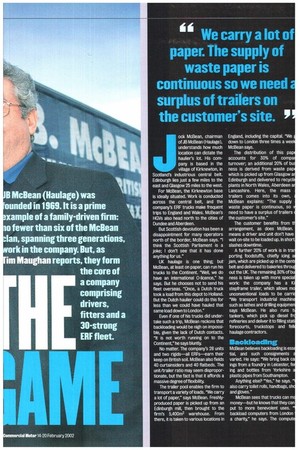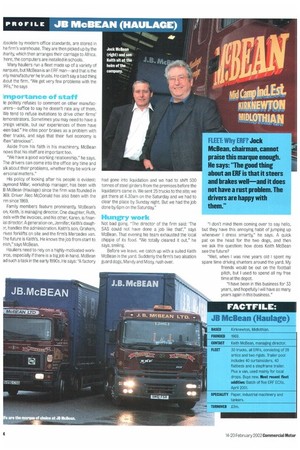B Mclean (Haulage) was
Page 43

Page 44

If you've noticed an error in this article please click here to report it so we can fix it.
ounded in 1969.1t is a prime Nik xample of a family-driven firm: 'I o fewer than six of the Mclean Ian, spanning three generations, ork in the company. But, as im Maughan reports, they form
the core of
Ea company comprising drivers, fitters and a 30-strong ERF fleet. Jock McBean, chairman of JB McBean (Haulage), understands how much location can dictate the haulier's lot. His company is based in the village of Kirknewton, in Scotland's industrious central belt. Edinburgh lies just a few miles to the east and Glasgow 25 miles to the west,
For McBean, the Kirknewton base is ideally situated. Work is conducted across the central belt, and the company's ERF trucks make frequent trips to England and Wales. McBean's HGVs also head north to the cities of Dundee and Aberdeen.
But Scottish devolution has been a disappointment for many operators north of the border, McBean says. "I think the Scottish Parliament is a joke; I don't see that it has done anything for us."
UK haulage is one thing; but McBean, at least on paper, can run his trucks to the Continent. "Well, we do have an international 0-licence," he says. But he chooses not to send his fleet overseas. "Once, a Dutch truck took a load from this depot to Holland. But the Dutch haulier could do this for less than we could have hauled that same load down to London."
Even if one of his trucks did undertake such a trip, McBean reckons that backloading would be nigh on impossible, given the lack of Dutch contacts. "It is not worth running on to the Continent," he says bluntly.
No matter. The company's 28 units and two rigids—all ER Es—earn their keep on British soil. McBean also fields 40 curtainsiders and 40 flatbeds. The unit/trailer ratio may seem disproportionate, but the fact is that it affords a massive degree of flexibility
The trailer pool enables the firm to transport a variety of loads, "We carry a lot of paper," says McBean. Freshlyproduced paper is picked up from an Edinburgh mill, then brought to the firm's 5,400m2 warehouse. From there, it is taken to various locations in
England, including the capital. "We down to London three times a wee McBean says.
The distribution of this pap accounts for 30% of compa turnover; an additional 20% of bu' ness is derived from waste pap which is picked up from Glasgow a Edinburgh and delivered to recycli plants in North Wales, Aberdeen a Lancashire. Here, the mass trailers comes into its own, McBean explains: "The supply waste paper is continuous, so need to have a surplus of trailers 1 the customer's site."
The customer benefits from t arrangement, as does McBean. means a driver and unit don't have wait on-site to be loaded up. In short slashes downtime.
A further 20% of work is in tra porting foodstuffs, chiefly icing a jam, which are picked up in the cent belt and delivered to bakeries throu: out the UK. The remaining 30% of bu ness is taken up with more special work: the company has a Ki stepframe trailer, which allows mil unconventional loads to be carri: "We transport industrial rnachin: such as lathes and drilling equipmen says McBean He also runs t tankers, which pick up diesel fr: refineries and deliver it to filling stati forecourts, truckstops and felli haulage contractors.
Backloading
McBean believes backloading is ess tial, and such consignments varied. He says: We bring back ea 'rigs from a foundry in Leicester, fe trig and bottles from Yorkshire . plastic pipes from Southampton Anything else? "Yes," he says. also also carry toilet rolls, handbags, shi and gloves."
McBean sees that trucks can m. money—but he knows that they can put to more benevolent uses. " backload computers from London a charity" he says The compute )bsolete by modern office standards, are stored in he firm's warehouse. They are then picked up by the iharity, which then arranges their carriage to Africa. 'here, the computers are installed in schools.
Many hauliers run a fleet made up of a variety of narques, but McBean is an ERE man—and that is the wily manufacturer he trusts. He can't say a bad thing ibout the firm. "We get very few problems with the :RFs," he says
Importance of staff
le politely refuses to comment on other manufacurers—suffice to say he doesn't rate any of them. We tend to refuse invitations to drive other firms' lemonstrators. Sometimes you may need to have a preign vehicle, but our experiences of them have • een bad." He cites poor brakes as a problem with ither trucks, and says that their fuel economy is ■ ften "atrocious".
Aside from his faith in his machinery, McBean flows that his staff are important too.
"We have a good working relationship," he says. The drivers can come into the office any time and alk about their problems, whether they be work or ersonal matters."
His policy of looking after his people is evident: laymond Millar, workshop manager, has been with B McBean (Haulage) since the firm was founded in )69. Driver Alec McDonald has also been with the rm since 1969.
Family members feature prominently. McBean's on, Keith, is managing director. One daughter, Ruth, eals with the invoices, and his other, Karen, is finanial director. A generation on, Jennifer, Keith's daughr, handles the administration. Keith's son, Graham, rives forklifts on site and the firm's Mercedes van. the future is Keith's. He knows the job from start to nish," says McBean.
Hauliers need to rely on a highly-motivated workroe, especially if there is a big job in hand. McBean ad such a task in the early 1990s. He says: "A factory
had gone into liquidation and we had to shift 500 tonnes of steel girders from the premises before the liquidators came in. We sent 25 trucks to the site; we got there at 4.30am on the Saturday and we had to clear the place by Sunday night. But we had the job done by 6pm on the Saturday."
Hungry work
Not bad going. "The director of the firm said: 'The SAS could not have done a job like that'," says McBean. That evening his team exhausted the local chippie of its food. "We totally cleared it out," he says, smiling.
Before we leave, we catch up with a suited Keith McBean in the yard. Suddenly the firm's two alsation guard dogs, Mandy and Missy, rush over.
"I don't mind them coming over to say hello, but they have this annoying habit of jumping up whenever I dress smartly," he says. A quick pat on the head for the two dogs, and then we ask the question: how does Keith McBean see the future?
"Well, when I was nine years old I spent my spare time driving shunters around the yard. My friends would be out on the football pitch, but I used to spend all my free time at the depot.
"I have been in this business for 33 years, and hopefully I will have as many years again in this business."
FACTFILE:
JB McBean (Haulage)
BASED Kirknewton, Midlothian.
FOUNDED 1969.
CONTACT Keith McBean, managing director.
FLEET 30 trucks, all ERFs, consisting of 28 wiles and two rigids. Trailer pool includes 40 curtainsiders, 40 flatbeds and a stepframe trailer. Plus a van, used mainly for local drops. Buys new. Most recent fleet addition: Batch of five ERF ECXs, April 2001.
SPECIALITY Paper, industrial machinery and tankers.
TURNOVER £3m.












































































































































